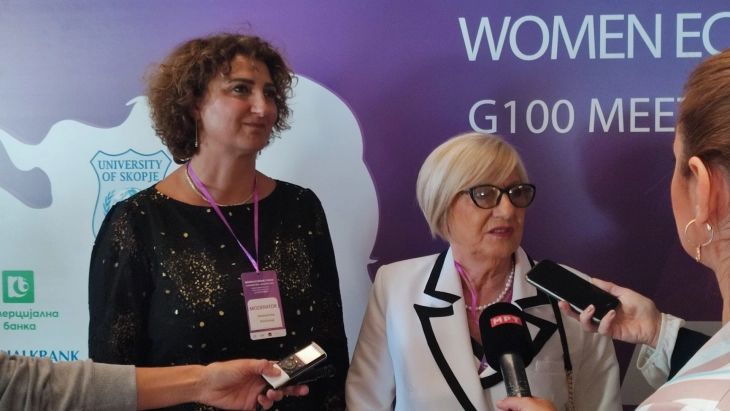Women Economic Forum - Balkans 2024: Stereotypes and tradition remain as barriers for Macedonian women
- Stereotypes, tradition, culture and religion are just some of the challenges faced by women in the country. According to data, women are paid less despite holding the same posts as men, especially when it comes to managerial positions, concluded participants ahead of the beginning of the Women Economic Forum – Balkans 2024, held in Skopje on Wednesday and Thursday.
- Post By Angel Dimoski
- 12:26, 2 October, 2024

Skopje, 2 October 2024 (MIA) - Stereotypes, tradition, culture and religion are just some of the challenges faced by women in the country. According to data, women are paid less despite holding the same posts as men, especially when it comes to managerial positions, concluded participants ahead of the beginning of the Women Economic Forum – Balkans 2024, held in Skopje on Wednesday and Thursday.
Participants stressed the need for implementing systemic measures to ensure more women hold managerial positions.
“We play a key role, but that isn’t visible, we must boost the visibility of women. They need to connect with each other. We’re not here, at the forum, to only discuss, but also to define concrete solutions. Here in Macedonia, stereotypes, tradition, culture and religion are challenges that need to be overcome. These are barriers that for centuries have been embedded in our life. The only way to deal with them is to stand up to them and to constantly build ourselves up so we can continue forward,” said Lenka Ugrinovska, President of the Association of Women Managers "ELIT".
Makedonka Dimitrova, President of the Women Economic Forum’s Organizing Board and head of the ECOS Sustainability Institute, said the situation of women is improving, not only in the country, but also globally.

“We are much stronger together. That’s why we organized this Forum, and it is no coincidence that sustainability has been present in all panels as a leitmotif. We will talk about how businesses can be sustainable, how much women can catalyze this process, how much we can support the green transition, whether we face the same challenges, which practices and methods can be used to improve the position of women and how companies can create an environment that will encourage women’s career development, as well as the conditions to overcome the traditional barriers, i.e., the role of a woman as a wife, mother, daughter-in-law...,” Dimitrova said.
According to Dimitrova, women in the country aren’t as competitive as men on the labor market.
“Data shows that women are paid less for the same positions, and we strive for income to reflect the quality and preparedness, and not gender. I would especially highlight the managerial positions. However, now there are so-called quotas in the EU member states that must be filled in the next few years,” Dimitrova said.
In this context, Ugrinovska added that the countries who have implemented such systemic measures have seen the number of women in managerial posts rise by 10 to 15 percent, as opposed to 2 percent in countries without such measures.
“That’s a big difference. It’s best to value quality, but the only way to take primacy from men is to implement such systemic measures. Our association wants to implement this,” Ugrinovska said.
The Women Economic Forum - Balkans 2024 brings together 270 leaders, entrepreneurs, activists, researchers and academics. It aims at improving the position of women in the modern society through economic strengthening, reducing gender inequality and stimulating women’s leadership.
Photo: MIA







